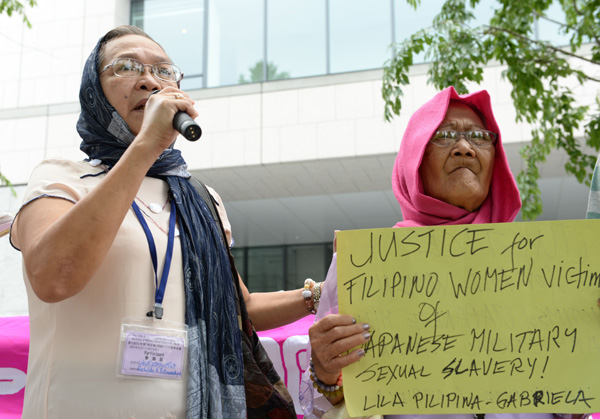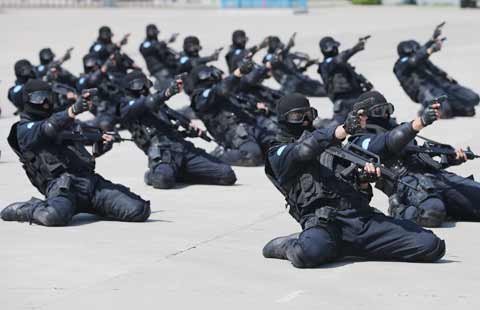Apologizing for atrocities
Updated: 2014-07-30 08:04
By He Na and Zhang Lei (China Daily)
|
|||||||||||
 |
|
Filipino representatives of the victims of the Japanese sex crimes during the war call for justice during a rally in Tokyo in June. Ma Ping / Xinhua |
Mounting pressure
The Japanese government has repeatedly refused to officially acknowledge the atrocities even though it has been almost seven decades since they were committed.
Historians from Western countries, foreign NGOs, other researchers and members of the public have also called for more to be done to acknowledge these war crimes.
"The issue of comfort women is in my judgment a significant aspect of Japanese atrocities in WWII. They were, in a high proportion of cases, women in effect kidnapped in Korea, China, the Philippines, the Dutch East Indies and elsewhere," said Gerhard L. Weinberg, a US diplomatic and military historian noted for his studies of WWII and a professor of history at the University of North Carolina.
"As a result, they were not only brutalized but, what is often overlooked, also exposed to the hazards of war. Many lost their lives in the bombing of bases and camps where they were held, and also when ships on which they were being sent to and from Japanese garrisons all over the Pacific were sunk.
"The victims deserve commemoration as well as compensation as a significant aspect of a terrible and entirely avoidable systematic misconduct by Japanese forces in WWII," said Weinberg, who is also a member of the Historical Advisory Panel of The Nazi War Crimes and Japanese Imperial Government Records Interagency Working Group.
Support from West
The West began to acknowledge Japan's war crimes involving comfort women only in the 1990s, when more research findings were released and media coverage of the issue increased. More countries have since been showing their support for the victims.
The historical advisory panel announced its final report to the US Congress in 2007 with detailed findings on Japan's war crimes, including those involving comfort women.
Some Western and European countries such as the US, Canada and Netherlands also enacted legislative resolutions on human rights or made motions demanding an apology and compensation from the Japanese government for its WWII sex slavery crimes.
Besides official support, more foreign NGOs, researchers and others have expressed shock.
"It's a well-known fact in the West that the Japanese abused comfort women in various countries they conquered. People in North America believe it to be the absolute truth," said Angela Elliott, a Canadian writer who was among the foreign internees of a Japanese camp in Weifang, Shandong province, during World War II.
"It has been so many years, and they still will not pay compensation. The women must have suffered beyond imagination and barely survived with so much abuse. There is no excuse for dismissing the charge," she said.
"Words cannot describe what these women had to go through and what makes it worse is Japan's refusal to rectify the actions," Elliott said.
She suggested that readers read a book called The Comfort Women by George Hicks, who describes the Japanese actions as bestial.
The Washington Coalition for Comfort Women Issues said the Japanese government must clearly acknowledge its responsibility for the crimes against the comfort women and should officially apologize to these victims. It must also provide redress for the crimes from government sources and not from the so-called Private Fund.
"I often receive foreign visiting groups to our center. The latest one was in early July consisting of US teachers, students and citizens. They showed great interest in the comfort women issue. One high school teacher from New Jersey told me she felt that the issue is very important, and she will give her students a special lesson on it," said Su, the research center director.
"It is a shame that Japan shirks responsibility for its actions during WWII, and I am surprised that there wasn't greater reaction to their atrocities, including forced sex slaves, before this time," said Chris Hagen, a former journalist for the Gaston Gazette in North Carolina, US, who lived in Tianjin for many years before 1949.
"It angers me that Japan refuses to apologize, and little or no compensation has come from them," he said.
"I can honestly say that many of my Chinese friends in Tianjin have a bitter attitude toward the Japanese. Only when Japan recognizes its crimes, begs for forgiveness, and compensation of some sort is given, can the Chinese truly put this part of history behind them, I believe. Shame on Japan. They 'lost the face' of countless generations, and still refuse to do what is morally right."
Most of the comfort women must be gone by now, and the international world is starting to forget. That, too, is a great shame, Hagen said.
David Waller, a professor at the business school at the University of Technology, Sydney, said that in Australia, little was known about comfort women until 2007 when Jan Ruff O'Herne, a former Dutch comfort woman, started speaking out about it.
"It's a difficult subject to discuss, but an important one to help understand the brutality and inhumanity of war. For Australians, it was realized that the women were not just Chinese or Korean, Indonesian or Filipino, but included Dutch women - and in Jan's situation someone still alive and living in Australia," Waller said.
"This was a terrible part of war, but I would encourage further research on this to shine a light on this evil so it will never happen again."
Learning from Germany
On Dec 7, 1970, then-German chancellor Willy Brandt fell to his knees at a monument in Warsaw, Poland's capital, to the ghetto uprising against the Nazis and begged for forgiveness for Germany's atrocities against the Jewish victims.
In stark contrast, top Japanese government officials often pay visits to the Yasukuni Shrine which honors WWII war criminals.
Mike Bastin, a lecturer at Southampton Solent University, suggested that Japan learn from Germany.
"The topic of comfort women continues to disgust the Western world. The Western world now wants to see a full, public apology from the Japanese and substantial compensation paid by the Japanese government," he said.
"Relations between Germany and other Western nations have developed well partly due to apologies for wartime atrocities by the Germans. The West is still waiting for apologies from the Japanese," Bastin said.
"Sexual violence in wars is not new and regrettably still goes on even today. But the war ended 69 years ago and the truly important thing is to make sure a cataclysmic event cannot happen again," said Steve Tsang, director of the China Policy Institute at the University of Nottingham.
A conflict between China and Japan will be a cataclysmic one, and it must be avoided at all costs, he said.
Contact the writers at hena@chinadaily.com.cn
Han Junhong contributed to this story.
Today's Top News
Britain announces visa reform package in China
US, EU to slap sanctions on Russia
Microsoft likely under antitrust probe
Uygur extremists 'training abroad'
'Family feud' that led to bloodbath
Smashing glass ceiling at a Parisian 'palace'
Kiev claims more territory
McDonald's fishing for supplier
Hot Topics
Lunar probe , China growth forecasts, Emission rules get tougher, China seen through 'colored lens', International board,
Editor's Picks

|

|

|

|

|

|





